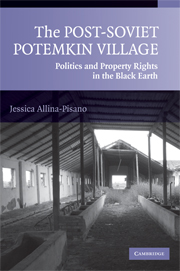Book contents
- Frontmatter
- Contents
- List of Maps, Illustrations, and Tables
- Acknowledgments
- Note on Transliteration
- Note on Sources and Methodology
- Glossary
- Two regions of the Black Earth, Voronezh and Kharkiv oblasti, 1991–present
- Voronezh oblast' in the twenty-first century
- Kharkiv oblast' in the twenty-first century
- The Post-Soviet Potemkin Village
- Introduction: Land Reform in Post-Communist Europe
- 1 Things Fall Apart
- 2 Keeping the Collectives
- 3 The Social Origins of Private Farmers
- 4 A Return to Regulation
- 5 The Politics of Payment
- 6 The Facade
- Conclusion: Rural Proletarians in the Potemkin Village
- Index
1 - Things Fall Apart
Published online by Cambridge University Press: 27 July 2009
- Frontmatter
- Contents
- List of Maps, Illustrations, and Tables
- Acknowledgments
- Note on Transliteration
- Note on Sources and Methodology
- Glossary
- Two regions of the Black Earth, Voronezh and Kharkiv oblasti, 1991–present
- Voronezh oblast' in the twenty-first century
- Kharkiv oblast' in the twenty-first century
- The Post-Soviet Potemkin Village
- Introduction: Land Reform in Post-Communist Europe
- 1 Things Fall Apart
- 2 Keeping the Collectives
- 3 The Social Origins of Private Farmers
- 4 A Return to Regulation
- 5 The Politics of Payment
- 6 The Facade
- Conclusion: Rural Proletarians in the Potemkin Village
- Index
Summary
On a Friday morning in April 1991, B. D. Mostovoi faced a problem. A refrigeration unit had broken down in the livestock section of the state farm he directed. The unit stored milk, one of the chief sources of income for the farm. The emergency was reported right away to the district agricultural services office, but no repairman was available until the following afternoon. By Monday, it had become clear that the necessary spare part was not available in the district. One had been located in a neighboring district – and another, one journalist dryly noted, in the far-off Chuvash republic. Meanwhile, the state farm sent its usual delivery of milk, now already half-spoiled, to the local dairy processing plant. By the fourth day of the emergency, the head veterinarian of the farm, A. G. Oprishchko, had gone to the media with the story. As the days and hours wore on, Mostovoi worried about who would pay for the substantial losses that continued to accumulate as long as the refrigerator remained out of service.
Mostovoi's problem was absolutely typical of its time. People across the Black Earth faced challenges at the dawn of the post-Soviet era that had little to do with ownership of land. Instead, collective and state farms contended with material and personnel shortages: inputs became increasingly scarce as inter-enterprise networks broke down, infrastructure of all kinds deteriorated, and price scissors made agriculture unprofitable, feeding further disintegration.
- Type
- Chapter
- Information
- The Post-Soviet Potemkin VillagePolitics and Property Rights in the Black Earth, pp. 28 - 52Publisher: Cambridge University PressPrint publication year: 2007

